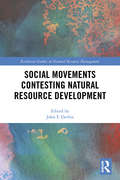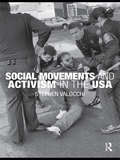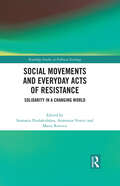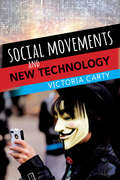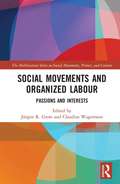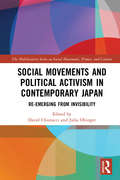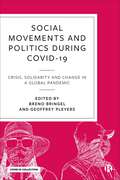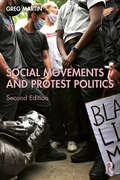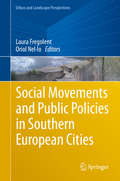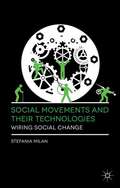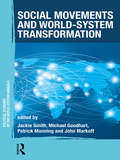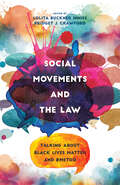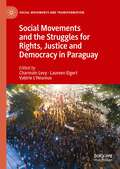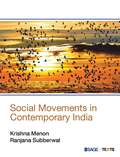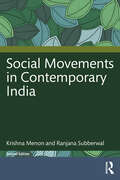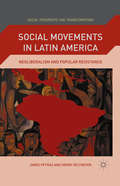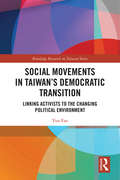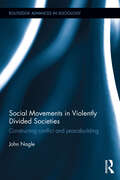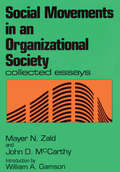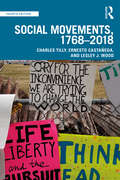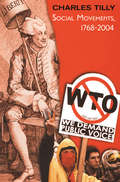- Table View
- List View
Social Movements Contesting Natural Resource Development (Earthscan Studies in Natural Resource Management)
by John F. DevlinPresenting a broad range of case studies, this book explores rural social movements contesting natural resource development initiatives. Natural resource development takes multiple forms, including infrastructure corridors, mines, dams, resource processing plants and pipelines. Many of which are driven by economic valuations, whilst social and environmental effects are given limited consideration. In this volume the authors discuss the emergence, process and outcomes of social movements with respect to these natural resource development projects, including examples of confrontation seeking to either block developments or promote alternative development approaches, such as agritourism. The examples taken from Africa, Asia, North America, Europe and Latin America demonstrate the diversity of struggles stimulated by natural resource development, including both immediate and longer-term effects, repertoires of action, political and cultural work. Taken together the case studies provide a rich overview of current movements engaged in resisting the neoliberal agenda of global resource exploitation. This book will be key reading for scholars interested in social movements, natural resource development, environmental policy and development studies. It will also be of interest to activists engaged in mobilizations stimulated by natural resource development projects.
Social Movements and Activism in the USA
by Stephen ValocchiWhat can we learn when we listen closely to and engage in dialogue with social movement activists? Social Movements and Activism in the USA addresses this question for a group of progressive activists in Hartford, Connecticut, who do community, labor, feminist, gay and lesbian, peace, and anti-racist organizing. Situated within the twenty-first-century landscape of post-industrialism and neo-liberalism and drawing on oral histories, the book argues for a dialogic and integrative approach to social movement activism. The dialogue between scholar and activist captures the interpretive nature of activists' identity, the variable ways activists decide on strategies and goals, the external constraints on activism, and the creative ways activists manoeuvre around these constraints. This dialogic approach makes the book accessible and useful to students, scholars, and activists alike. The integrative nature of the text refers to its theoretical approach. Rather than advancing a new theory of social movements, it uses existing approaches as a tool kit to examine the what, how, who, and why of social movement activism.
Social Movements and Everyday Acts of Resistance: Solidarity in a Changing World (Routledge Studies in Political Sociology)
by Stamatis Poulakidakos Anastasia Veneti Maria RoviscoThis book focuses on small-scale mobilisation and everyday social movements that take the form of grassroots resistance and solidarity initiatives. Through a series of case studies drawn from the UK, Europe, India, and Latin America, it examines the dynamics and role of micro-acts of resistance, with attention to a range of themes including organisational issues, the construction of collective identity, strategies, tactics and participation, and media representations and public perception of small-scale social movements. As such, it will appeal to scholars and students of sociology, media and communication and politics with interests in social movements, political mobilisation and activism.
Social Movements and New Technology
by Victoria CartyThe emergence of new information communication technologies--such as the Internet and social media networking sites and platforms--has strongly affected social movement activism. In this compelling and timely book, Victoria Carty examines these movements and their uses of digital technologies within the context of social movement theory and history. With an accessible and unique mix of theory and real-world examples, Social Movements and New Technology takes readers on a tour through MoveOn and Tea Party e-mail campaigns, the hacktavist tactics of Anonymous, global online protests against rapists and rape culture, and the tweets and Facebook pages that accompanied uprisings across the Arab world, Europe, and the United States. In each case study, the reader is invited to examine the movement, organization or protest and their use of digital tools through the lens of social movement theory. Discussion questions at the end of each chapter invite critical thinking and further reflection and debate.
Social Movements and New Technology
by Victoria CartyThe emergence of new information communication technologies-such as the Internet and social media networking sites and platforms-has strongly affected social movement activism. In this compelling and timely book, Victoria Carty examines these movements and their uses of digital technologies within the context of social movement theory and history. With an accessible and unique mix of theory and real-world examples, Social Movements and New Technology takes readers on a tour through MoveOn and Tea Party e-mail campaigns, the hacktavist tactics of Anonymous, global online protests against rapists and rape culture, and the tweets and Facebook pages that accompanied uprisings across the Arab world, Europe, and the United States. In each case study, the reader is invited to examine the movement, organization or protest and their use of digital tools through the lens of social movement theory. Discussion questions at the end of each chapter invite critical thinking and further reflection and debate.
Social Movements and Organized Labour: Passions and Interests (The Mobilization Series on Social Movements, Protest, and Culture)
by Claudius Wagemann Jürgen R. GroteThis book is about the building of alliances and about joint activities between two groups of social movement actors ascribed increasing relevance for the functioning and the eventual amendment of democratic capitalism. The chapters provide a well-balanced mix of theoretical and empirical accounts on the political, social and economic catalysts behind the changing motives finding expression in a multitude of novel types of joint collective action and inter-organizational alliances. The contributors to this volume go beyond attempting to place unions, movements, crises, precariousness, protests and coalitions at the centre of the research. Instead, they focus on actors who themselves transcend clear-cut social camps. They look at the values and motives underlying collective action by both types of actors as much as at their structural and strategic properties, and inter-organizational relations and networks. This creates a fresh, genuine and historically valid account of the incompatibilities and the commonalities of movements and unions, and of prospects for inter-organizational learning.
Social Movements and Political Activism in Contemporary Japan: Re-emerging from Invisibility (The Mobilization Series on Social Movements, Protest, and Culture)
by David Chiavacci Julia ObingerThis book explores social movements and political activism in contemporary Japan, arguing that the 2011 Fukushima nuclear accident marks a decisive moment, which has led to an unprecedented resurgence in social and protest movements and inaugurated a new era of civic engagement. Offering fresh perspectives on both older and more current forms of activism in Japan, together with studies of specific movements that developed after Fukushima, this volume tackles questions of emerging and persistent structural challenges that activists face in contemporary Japan. With attention to the question of where the new sense of contention in Japan has emerged from and how the newly developing movements have been shaped by the neo-conservative policies of the Japanese government, the authors ask how the Japanese experience adds to our understanding of how social movements work, and whether it might challenge prevailing theoretical frameworks.
Social Movements and Politics during COVID-19: Crisis, Solidarity and Change in a Global Pandemic
by Breno Bringel and Geoffrey PleyersEPUB and EPDF available Open Access under CC-BY-NC-ND licence. The COVID-19 pandemic has deeply shaken societies and lives around the world. This powerful book reveals how the pandemic has intensified socio-economic problems and inequalities across the world whilst offering visions for a better future informed by social movements and public sociology. Bringing together experts from 27 countries, the authors explore the global echoes of the pandemic and the different responses adopted by governments, policy makers and activists. The new expressions of social action, and forms of solidarity and protest, are discussed in detail, from the Black Lives Matter protests to the French Strike Movement and the Lebanese Uprising. This is a unique global analysis on the current crisis and the contemporary world and its outcomes.
Social Movements and Protest Politics
by Greg MartinThis fully revised and updated edition of Social Movements and Protest Politics provides interdisciplinary perspectives on the sociology of protest movements. It considers major theories and concepts, which are presented in a clear, accessible, and engaging format. The second edition contains new chapters on methods and ethics of social movement research, and legal mobilisation, protest policing and criminal justice activism, including calls to abolish or defund police made at protests during the COVID-19 pandemic. This edition introduces readers to the concept of the ‘post-protest society’ wherein the right to protest is whittled away to near vanishing point, and authorities have considerable legal recourse to ban protests and render the tactics of protest movements ineffective. The book also looks at recent developments and novel social movements, including Black Lives Matter, Extinction Rebellion, Gilets Jaunes, #MeToo, and Hong Kong’s Umbrella Movement, as well as the rise of contemporary forms of populism in democratic societies. The book presents specific chapters outlining the early origins of social movement studies and more recent theoretical and conceptual developments. It considers key ideas from resource mobilisation theory, the political process model, and new social movement approaches. It provides extensive commentary on the role of culture in social protest (including visual images, emotions, storytelling, music, and sport), religious movements, geography and struggles over space, media and movements, and global activism. Historical and contemporary case studies and examples from a variety of countries are provided throughout, including the American civil rights movement, Greenpeace, Pussy Riot, Indigenous peoples’ movements, liberation theology, Indignados, Occupy, Tea Party, and Arab Spring. Each chapter also contains illustrations and boxed case studies to demonstrate the issues under discussion. Social Movements and Protest Politics will be an indispensable resource for undergraduate and postgraduate students in the social sciences and humanities wanting to be introduced to or extend their knowledge of the field. The book will also prove useful to university teachers and academic researchers, activists, and practitioners interested in the study of social, cultural, and political protest.
Social Movements and Public Policies in Southern European Cities (Urban and Landscape Perspectives #21)
by Laura Fregolent Oriol Nel·loThe book analyzes the impact of urban movements on government and public policies in a context of rapid urban transformations, public policy crises and increasing social inequalities. The essays show how the impact of the movements is increasing and has effects both in the orientation of the policies, as in their form of management and its effects. The authors are leading scholars from universities and research centers in Spain, Italy, Portugal, France, Germany and the United Kingdom.
Social Movements and Sexual Citizenship in Southern Europe
by Ana Cristina SantosThis book explores the relationship between social movements, sexual citizenship and change in Southern Europe. Providing a comparative analysis about LGBT issues in Italy, Spain and Portugal, it discusses how activism can generate legal, political and cultural impact in post-dictatorial, Catholic and EU-focused countries.
Social Movements and Their Technologies
by Stefania MilanNow in paperback for the first time, Social Movements and their Technologies explores the interplay between social movements and their 'liberated technologies'. It analyzes the rise of low-power radio stations and radical internet projects ('emancipatory communication practices') as a political subject, focusing on the sociological and cultural processes at play. It provides an overview of the relationship between social movements and technology, and investigates what is behind the communication infrastructure that made possible the main protest events of the past fifteen years. In doing so, Stefania Milan illustrates how contemporary social movements organize in order to create autonomous alternatives to communication systems and networks, and how they contribute to change the way people communicate in daily life, as well as try to change communication policy from the grassroots. She situates these efforts in a historical context in order to show the origins of contemporary communication activism, and its linkages to media reform campaigns and policy advocacy.
Social Movements and World-System Transformation: The Politics Of Crisis And Transformation (Political Economy of the World-System Annuals)
by John Markoff Patrick Manning Jackie Smith Michael GoodhartAt a particularly urgent world-historical moment, this volume brings together some of the leading researchers of social movements and global social change and other emerging scholars and practitioners to advance new thinking about social movements and global transformation. Social movements around the world today are responding to crisis by defying both political and epistemological borders, offering alternatives to the global capitalist order that are imperceptible through the modernist lens. Informed by a world-historical perspective, contributors explain today’s struggles as building upon the experiences of the past while also coming together globally in ways that are inspiring innovation and consolidating new thinking about what a fundamentally different, more equitable, just, and sustainable world order might look like. This collection offers new insights into contemporary movements for global justice, challenging readers to appreciate how modernist thinking both colors our own observations and complicates the work of activists seeking to resolve inequities and contradictions that are deeply embedded in Western cultural traditions and institutions. Contributors consider today’s movements in the longue durée—that is, they ask how Occupy Wall Street, the Arab Spring, and other contemporary struggles for liberation reflect, build upon, or diverge from anti-colonial and other emancipatory struggles of the past. Critical to this volume is its exploration of how divisions over gender equity and diversity of national cultures and class have impacted what are increasingly intersectional global movements. The contributions of feminist and indigenous movements come to the fore in this collective exploration of what the movements of yesterday and today can contribute to our ongoing effort to understand the dynamics of global transformation in order to help advance a more equitable, just, and ecologically sustainable world.
Social Movements and the Law: Talking about Black Lives Matter and #MeToo
by Lolita Buckner Inniss and Bridget J. CrawfordBlack Lives Matter and #MeToo are two of the most prominent twenty-first-century social movements in the United States. On the ground and on social media, more people have taken an active stance in support of either or both movements than almost any others in the country's history. Social Movements and the Law brings together the voices of twelve scholars and public intellectuals to explore how Black Lives Matter and #MeToo unfolded—separately and together—and how they enrich, inform, and complicate each other. Structured in dialogues and punctuated with informative text boxes, illustrations, and discussion questions, this accessible guide to an increasingly influential area of the law centers rich intersectional analysis of both movements and prompts readers to undertake further reflection and conversation. At a time of heightened public attention to the broader implications of human social behavior and interaction, this book shows rather than tells how people with different perspectives can engage one another with open minds and generosity of spirit.
Social Movements and the Struggles for Rights, Justice and Democracy in Paraguay (Social Movements and Transformation)
by Charmain Levy Laureen Elgert Valérie L’HeureuxParaguay is an under-examined, but remarkably fascinating country, where war, dictatorship, and elite capture have produced cycles of popular mobilization and repression. Yet, its social movements are less known to international audiences. This book analyzes Paraguay’s principal social movements since the transition to democracy and examines how, in the context of a weak state, authoritarian political elite, and a deficient democratization process, they contribute to progressive policy, socio-economic development, and democracy. Using critical perspectives in sociology, anthropology, geography, and political science, we bring together scholars, activists, and practitioners of social critique and community organizing. They reflect on movements involving peasant, indigenous and agrarian rights to land and livelihoods, LGBTQ and feminist struggles, labor union struggles, and student demands for access to quality education and social development, while exploring how the particularisms of Paraguay result in differences from other Latin American movements and how overarching regional tendencies may explain the similarities. This volume is the first English-language book on social movements in Paraguay. As such, it aims to provide a deeper understanding Paraguay’s principal social movements since the transition to democracy. This volume contributes to analyzing how social movements within the context of aweak state, authoritarian political elite, and a deficient democratization process contribute to progressive public policy, socio-economic development, and democracy. In addition, this book focuses on how Paraguayan social movements are similar to or different from their Latin American counterparts, how the particularism of Paraguay explains these variations and how overarching regional tendencies explain the similarities. The contribution of this volume is twofold: to provide new empirical examples in the study of Latin American social movements and their contribution to development and democracy, as well as to validate or challenge social movement theories by employing empirical studies of Paraguayan social movements. Each chapter delves into the background to a specific movement, while closely analyzing the movement in the post-Lugo era (2012-2021). Together the chapters in this book contribute to a better understanding of social movements in Paraguay and Latin America thus dialoguing with the existing literature and social movement theories and considering how such studies can further our understanding of social movements in Paraguay and in Latin America in general. Finally, the study of different social movements within the Paraguayan context takes into consideration the links that each movement has forged with other such movements in Latin America, including the contributions that Paraguayan social movements have made to regional networks.
Social Movements in Contemporary India
by Krishna Menon Ranjana SubberwalAn interdisciplinary text that offers a comprehensive understanding of social movements, their cause, course and effects in modern-day India. Contemporary India is experiencing widespread changes and developments in its society, polity and economy, resulting in a variety of social movements in recent years. This textbook offers an understanding of these movements, issues and discourses around them, and relates them to the wider society and resultant changes occurring within it. With a specific focus on India, the book delves into the concept and definition of social movements from different perspectives and offers a critical insight into the fundamental and ongoing debates and treatises around these movements. It covers discussion on a wide range of movements varying in locus and spatial spread - from environmental movements to disability, queer and women's rights movements as well as those by civil society, farmers, and marginalized sections of the society. Key Features: • Adopts an interdisciplinary approach to serve students of sociology, political science, history and other related disciplines • Provides a detailed treatment of civil society movements along with highlights on some landmark mobilizations • Draws on latest research and empirical studies; content aided by boxed features, review exercises and extensive referencing
Social Movements in Contemporary India
by Krishna Menon Ranjana SubberwalThis book delves into the concept and definition of social movements from different perspectives with relevance to India. It offers critical insight into the fundamental and ongoing debates and treatises around the struggle for rights and welfare.The book covers discussions on a wide range of movements varying in locus and spatial spread – from movements that highlight environmental issues to those that articulate the voices of women, Dalits, the queer community, persons with disabilities, and farmers. It explores the origins of people’s movements, what a collective is and how communities mobilize and organize. The authors also provide a history of the key social movements in India, examining the social, political, and cultural contexts in which they were born and continue being relevant in contemporary India.This revised and updated edition is an essential volume for students and researchers of social movement studies, sociology, political science and history, protest movements, sociological theory, the history of sociological thought, contemporary social theory, social policy, and international and globalization studies.
Social Movements in India
by Ghanshyam ShahSocial movements primarily take the form of non-institutionalised collective political action which strive for political and/or social change. While India has witnessed many such movements over the centuries, it is only recently that scholars have begun to study them in depth. This thoroughly revised and updated version of a seminal book critically examines and reviews the literature concerning social movements in India from 1857 to the present. In the process he discusses the theoretical issues raised by various scholars while analysing major trends in different movements. In conclusion, he suggests areas for future research. Proposing a logical classification of social movements in modern India, this book will be widely welcomed by social activists as well as by political scientists, historians and sociologists. It will also be invaluable as a text in courses on social movements.
Social Movements in Latin America
by Henry Veltmeyer James PetrasThe authors trace out the development of capitalism and U. S. imperialism in Latin America in the latest phase of this development, from the installation of the new world order of neoliberal globalization in the early 1980s to the present when U. S. imperialism is held at bay, neoliberalism is in decline, and capitalism is in crisis.
Social Movements in Taiwan’s Democratic Transition: Linking Activists to the Changing Political Environment (Routledge Research on Taiwan Series)
by Yun FanExamining the relationships between activists and the changing political environment, this book analyzes the trajectories of three major social movements in Taiwan during the country’s democratic transition between 1980 and 2000. In doing so, it explores why the labor and environmental movements became less partisan, while the women’s movement became more so. Providing a comparative discussion of these critical social movements, this book explores key theoretical questions and presents a rich and comprehensive analysis of social activism during this period of Taiwan’s political history. It focuses on causal mechanisms and variation and thus avoids the tautological trap of finding an "improving" political opportunity structure wherever a social movement is flourishing. Drawing on extensive data from over 140 activists’ demographic backgrounds, the discussion also builds upon existing studies of the "biographical" aspects of contention. This study then asks further questions about how certain tactics are chosen, not only how a repertoire of contention comes to have the shape it does. Combining both a theoretical and an empirical approach, this book will be useful to students and scholars of Taiwanese politics and society, as well as social movements and democracy more generally.
Social Movements in Violently Divided Societies: Constructing Conflict and Peacebuilding (Routledge Advances in Sociology)
by John NagleViolently divided societies present major challenges to institutions seeking to establish peace in places characterised by ethnic conflict and high levels of social segregation. Yet such societies also contain groups that refuse to be confined within separate forms of ethnic community and instead develop alternative modes of action that generate shared identities, build trust and foster consensual, peaceful politics. Advancing a unique social movement approach to the study of violently divided societies, this book highlights how various social movements function within a context of violent ethnic politics and provide new ways of imagining citizenship that complements peacebuilding. By analysing the impact of social movements on divided societies, this book contributes to debates about the complexity of belonging and identity, and constructs a nuanced understanding of political mobilisation in regions defined by ethnic violence. In turn, the book provides important insights into the dynamics of social movement mobilisation. Based on the author's extensive research in Lebanon and Northern Ireland, and drawing on numerous examples from other divided societies, this book examines a range of social movements, including nationalists, victims, sexual minorities, labour movements, feminists, environmentalists, secularists, and peace movements. Bringing together social theory and case studies in order to consider how grassroots movements intersect with political institutions, this book will be of interest to students, scholars and policymakers working in sociology and politics.
Social Movements in an Organizational Society: Collected Essays
by Mayer N. Zald John D. McCarthyFirst Published in 2017. Routledge is an imprint of Taylor & Francis, an Informa company.
Social Movements that Care: Empathy, Solidarity, and Empowerment in the Fight Against Evictions
by Felipe G. SantosThe Platform of Those Affected by Mortgages (PAH) has left a crucial mark in the history of Spanish social movements by advocating for the over 700,000 families that have been evicted since its inception in 2009. This book explores how the PAH has blocked thousands of evictions through civil resistance, prevented many more through negotiations with banks, and rehoused thousands of evicted families in apartments recuperated from banks and vulture funds. Through the framework of the Politics of Care, Felipe G. Santos explores the emotional, identity, and participatory challenges that hindered the mobilization of those affected by mortgages. The book also reveals how empathy from a group of people unaffected by mortgage issues sparked mobilization, and how care relationships empowered those facing eviction to lead the fight for housing rights.
Social Movements, 1768 - 2018
by Charles Tilly Lesley J. Wood Ernesto CastañedaSocial Movements 1768-2018 provides the most comprehensive historical account of the birth and spread of social movements. Renowned social scientist Charles Tilly applies his synthetic theoretical skills to explain the evolution of social movements across time and space in an accessible manner full of historical vignettes and examples. Tilly explains why social movements are but a type of contentious politics to decrease categorical inequalities. Questions addressed include what are the implications of globalization and new technologies for social movements, and what are the prospects for social movements? The overall argument includes data from mobilizations in England, Switzerland, Czechoslovakia, Russia, China, India, Argentina, Chile, Cuba, Mexico, Egypt, Tunisia, Iran, Iraq, and Kazakhstan. This new edition has been fully updated and revised with young researchers and students in mind. New case studies focus on social movements in Mexico, Spain, and the United States including Black Lives Matter, immigrants’ rights struggles, The Indignados, the Catalan movement for independence, #YoSoy132, Ayotzinapa43, mass incarceration and prisoner rights, and more. Timelines are included to familiarise the reader with the events discussed and discussion questions are framed to increase understanding of the implications, limits, and importance of historical and ongoing social movements.
Social Movements, 1768-2004
by Charles TillyWesterners invented social movements during the 18th century, but after that social movements became vehicles of popular politics across the world. By locating social movements in history, prize-winning social scientist Charles Tilly provides rich and often surprising insights into the origins of contemporary social movement practices, relations of social movements to democratization, and likely futures for social movements.
